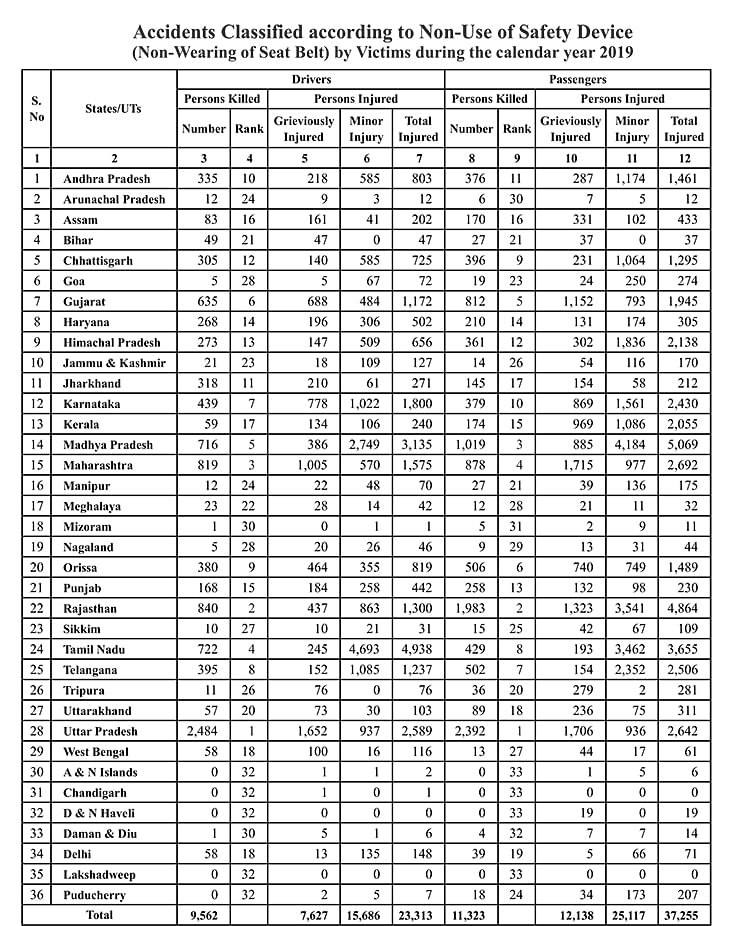Nitin Gadkari urges standardisation of 6 airbags in PVs
Six airbags will improve safety levels but implementation has a lot of challenges for automakers and calls for re-engineering along with cost increases.
The Minister of Road Transport and Highways, Nitin Gadkari, has urged carmakers in India to up the safety quotient in all passenger vehicles.
Following a meeting today with the representatives from the Society of Indian Automobile Manufacturers (SIAM), Gadkari tweeted, “In the interest of passenger safety, I have appealed all private vehicle manufacturers to compulsorily provide a minimum of 6 airbags across all variants and segments of the vehicle.”
It must be noted however that Gadkari’s statement is just an appeal and for now there is no plan for six airbags to be made mandatory.
A driver airbag had become compulsory for all passenger vehicles from July 1, 2019 and starting April 1 this year, a front passenger airbag became mandatory for all new cars launched, with existing models expected to comply from August 31 initially, though the deadline was then pushed back to December 31, 2021.
Commenting on the transport minister's view of six airbags in cars, Maruti Suzuki India chairman R C Bhargava told Autocar Professional: "Putting additional airbags is not a problem but the question is, who would pay the cost and where is people’s ability to buy such cars? Without customers, it will impact the growth of the auto industry even further."
Putting airbags is not a problem but the question is who would pay the cost and where is people’s ability to buy such cars? Without customers, it will impact the growth of the auto industry even further.
Challenges for automakers in India
Installation of additional airbags will help improve a vehicle’s crash safety, however there are many challenges. For one, the additional cost would be substantial especially in the budget segment. A front airbag in an entry level car can cost anywhere between Rs 5,000 to Rs 10,000 and side and curtain airbags can cost double that.
Additionally, installing these airbags will involve a lot of re-engineering in cars not originally designed to offer that level of protection. Changes to the body shell, as well as to the interior trim and fittings would be required to make sure that the airbags deploy effectively and safely. In some cases, the vehicle’s body shell and platform may simply not be able to support this and a manufacturer may simply have to wait for the next-generation platform.
In reality, most manufacturers offer six airbags in at least some of their models however these are all in the higher segments. The budget end of the car market, which also forms the bulk of the sales, do not have cars with six airbags while like Maruti Suzuki , Renault and Nissan, currently do not retail any models with six airbags.
Seatbelt strapping and the airbag safety connect
Seatbelts and airbags are an intrinsic part of a car’s restraint systems and they ‘collaborate’ in the event of a road crash or a sudden stop. While seatbelts work as primary restraint systems, airbags are the secondary restraint system. The two are linked by a unit called the SRS airbag module. In most cars, it is necessary for seatbelts to be fastened if the airbags are to deploy and protect the vehicle occupants.
In CY2019, as per MoRTH’s Road Accident Report, a total of 449,002 accidents took place in India, leading to 151,113 fatalities and 451,361 injuries. In percentage terms, the number of accidents decreased by 3.86 percent in 2019 over CY2018, while the accident-related deaths decreased by 0.20 % and the persons injured decreased by 3.86 percent. The decline in road accidents, killings and injuries reported in 2019 appear to have been a result of the Motor Vehicle Act implemented in States from September 1, 2019 which sharpened the focus on road safety.
However, the protection afforded by airbags now mandated in cars is rendered ineffective if seatbelts are not strapped on. In 2019, non-wearing of seatbelts was found to be associated with 20,885 deaths and accounted for 13.82 percent of total road accident deaths in the country during 2019 involving 9,562 drivers and 11,323 passengers.

RELATED ARTICLES
Cosmo First diversifies into paint protection film and ceramic coatings
The Aurangabad, Maharashtra-based packaging materials supplier is leveraging its competencies in plastic films and speci...
JSW MG Motor India confident of selling 1,000 M9 electric MPVs in first year
The 5.2-metre-long, seven-seater luxury electric MPV, which will be locally assembled at the Halol plant in Gujarat, wil...
Modern Automotives targets 25% CAGR in forged components by FY2031, diversifies into e-3Ws
The Tier-1 component supplier of forged components such as connecting rods, crankshafts, tie-rods, and fork bridges to l...






 04 Aug 2021
04 Aug 2021
 16351 Views
16351 Views










 Autocar Professional Bureau
Autocar Professional Bureau




